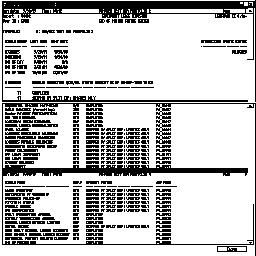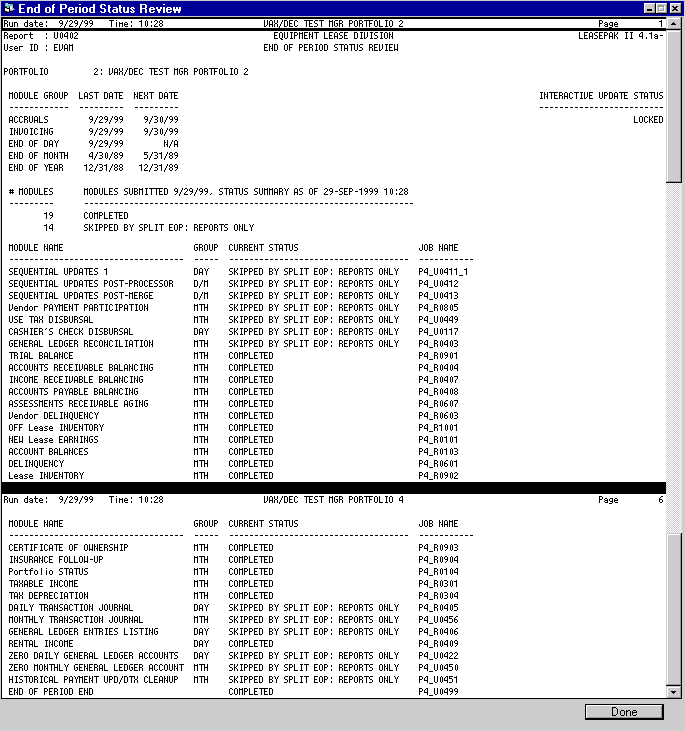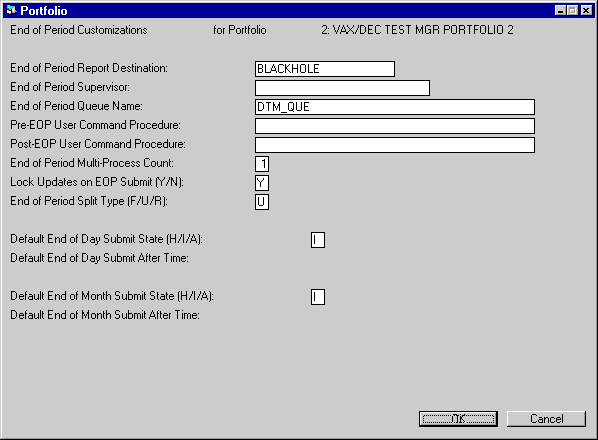High Volume Module
The High Volume module is a separately purchased module of LeasePak and is designed to run selected EOP updates/reports in parallel, by taking advantage of multiple CPU hardware; thus reducing the total elapsed time for EOP to run. The module will allow the user to set various parameters within LeasePak. These parameters are set in either Portfolio [U0212] or Custom General [U0712]. The following is a list of switches that work in conjunction with the High Volume module:
Split EOP
The High Volume module allows End of Period to split the EOP process to run selected updates and/or reports to based on selections made in the End of Period Customizations option of the Portfolio [U0212] update. The processes will actually be run on two separate environments.
The ‘U’ and ‘R’ options are provided to enable the user to run their EOP update modules in their live environment and to run their EOP report modules later in a different environment, on the same computer system. Because of the extra complexity with splitting EOP into separate update and report sections, MSI recommends against splitting the EOP unless necessary for performance reasons.
The following are steps required to run a Split EOP:
- First time only: set END
OF PERIOD SPLIT TYPE to ‘U’ in the End of Period Customizations
option of the Portfolio update [U0212].
-
Run end of period (End of Period option Submit
[U0401]). This will run
all updates selected in the Modules and Reports screen of the End of Period Customizations,
as well as any of the reports that must run prior to those updates. For example,
the Daily Transaction Journal
must run prior to Historical RTX Clean-Up, as the clean-up deletes records that
the transaction report must first list.
LeasePak will differentiate between Updates and Reports that are dependent on each other at the time the Update and Report environments are run.

-
Update Environment: EOP completes, including EOP End. Three differences from a
typical EOP:
(a) updates are still locked,
(b) EOP End did not execute the Post-Portfolio Updates such as Collections, and
(c) EOP end in U0402and U0404 will show split EOP in a halt state (last portfolio to complete only).

- Update Environment:
After the EOP has completed in the ‘U’ environment (last Portfolio as show by
U0402 Status Review, last Portfolio will appear in the halt state), operator runs
the split_eop_1 script from the Sybase DBA account:
> split_eop_1 environment dba [password]
- This script should
require only a few seconds. When it completes, the operator will see the message:
> EOD update complete - separate update and report systems.
This script prepared the database to run the ‘R’ environment. At this time the operator will copy the data into the ‘R’ environment either by sybdump, snapshot or by splitting the shadow drives.
Continue in ‘U’ environment:

- Update Environment:
Operator runs split_eop_2 script. This will prepare the ‘U’ environment for post_portfolio
processing. Once complete, updates will be unlocked and all portfolios originally
set to 'U' for split EOP will be automatically reset to 'U' for the next day's
processing.
* split_eop_2 environment eop-user dba [password]
eop-user is the account name entered at the LeasePak login screen to run EOP.
Continuing in ‘R’ environment:
-
Report Environment Operator Runs EOP (Submit
[U0401]) for all split portfolios, to run non-dependent reports. The EOP Status
Review [U0402] will appear as follows for Reports:

LeasePak Reference Guide
©
by McCue Systems Incorporated. All rights reserved.
The information contained in this document is the property of McCue Systems, Inc. Use of the information contained herein is restricted. Conditions of use are subject to change without notice. McCue Systems, Inc. assumes no liability for any inaccuracy that may appear in this document; the contents of this document do not constitute a promise or warranty. The software described in this document is furnished under license and may be used or copied only in accordance with the terms of said license. Unauthorized use, alteration, or reproduction of this document without the written consent of McCue Systems, Inc. is prohibited.
